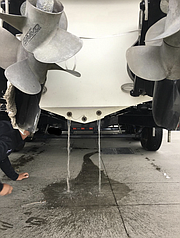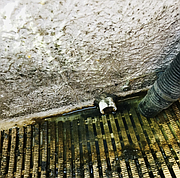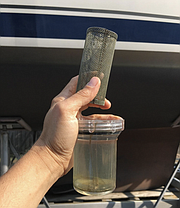Is Your Boat Ready for Winter?
The Bay Watcher citizen lake science program is coming to an end for the season. Volunteers have collected valuable water quality data from eight Coeur d'Alene Lake bays this season. As with most water quality data, it is important to look at long term trends, not single data points. However, here is a sneak peek at some of the temperature data we’re collecting with automated sensors. Temperature is an important determinant of oxygenation as influenced by nutrient load in the Lake.
With the field season ending, we are preparing to winterize the University of Idaho Research Boat, just as local boaters plan for the same. To prevent your beloved summer craft from freezing damage, here are some tips on how to protect engine blocks, potable water, and other systems while keeping the quality of our groundwater, lakes, and rivers in mind.
• Work with a professional boat mechanic to winterize your boat engine, change the oil, and ensure all water is drained from the engine block to prevent freezing. Please use water-safe antifreeze, available at marinas and auto parts stores.
• Winterize your potable water and sanitation systems by draining the freshwater tank and water lines; add non-toxic antifreeze to protect them from freezing.
• Remove drain plugs to drain all water and don’t forget to check pumps, bilges, livewells, and ballast tanks. Even small amounts of water can allow aquatic invasive species to survive winter and can lead to mildew or cracks from freezing.
• If you winterize your boats at home, please take care that your waste products do not flow into storm drains. Wash boats over vegetated areas or utilize commercial car wash facilities. Use spill prevention and containment measures to protect storm drains from accidental spills. Use secondary containment for chemicals; keep a spill response kit with absorbent products, broom, and dustpan; and use drip pans or other containment measures under your work area.
• Pressure wash the hull, scrub props and shafts, rudders, struts and trim tabs. Clean all thru-hulls and strainers. Make sure to remove all plant material, attached organisms, and slime.
• Be sure that batteries are fully charged and switches are turned off.
• Take measures to prevent mold and mildew buildup on the boat and thus the need for excess chemical/detergent use later.
• Seal any leaks and use a well-ventilated boat cover.
Take home messages:
• Never clean your boat or engine parts with solvents while on the water
• To prevent the spread of aquatic invasive species, thoroughly clean, drain, and dry your boat: invasivespecies.idaho.gov/boaters
• Use safe non-toxic marine engine antifreeze
• Never dump oil or other chemicals on impervious surfaces (concrete, asphalt, pavers, etc.), near gutters, down storm drains, or in any surface water
For more information on this and other water quality topics in this series, please visit: www.uidaho.edu/ourgem. The Our Gem Coeur d’Alene Lake Collaborative is a team of committed and passionate professionals working to preserve lake health and protect water quality by promoting community awareness of local water resources through education, outreach and stewardship. Our Gem includes local experts from the University of Idaho Community Water Resource Center, Coeur d’Alene Tribe Lake Management Department, Idaho Department of Environmental Quality, Kootenai Environmental Alliance, Coeur d’Alene Regional Chamber of Commerce, and CDA 2030.







